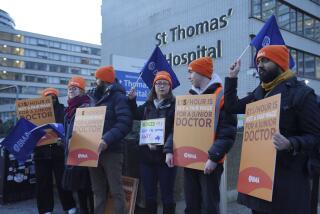Socialized Medicine: Britain’s Crown Jewel or a Sacred Cow?
- Share via
LONDON — Socialized health care offers Britons everything from flu shots to heart transplants without the painful after-effects of medical bills. But more than 700,000 people are waiting to get into state hospitals for surgery, and some have been waiting for years.
Is Britain’s National Health Service (NHS) a jewel in the crown of the welfare state, as supporters contend? Or is it “a mangy-looking sacred cow,” as a writer for the Financial Times, London’s business newspaper, suggested recently?
The tax-funded NHS, created after World War II to give the entire British population free health care, is a constant source of debate among Britons. Ninety percent of the nation’s 56 million people use the mammoth system.
A Top Concern
During the election campaign in June, opinion polls consistently put the NHS among the voters’ top three concerns, along with education and unemployment. Prime Minister Margaret Thatcher easily won a third consecutive term, but had to endure stinging attacks on her Conservative government’s record on health care.
Britain spends less on health care than any other major Western nation, and opponents accused Thatcher of starving the NHS of money, causing staff shortages and hospital closures.
To dramatize its case, the socialist Labor Party, Thatcher’s main political opposition, produced a 10-year-old boy who had been waiting 18 months for surgery to correct a heart defect. Thatcher, insisting that “the NHS is safe in our hands,” countered that the Conservatives have improved efficiency and raised spending on the health service by 13% in real terms since she first came to power in 1979.
Criticism during the campaign invariably focused on the degree of government support for the health service, not on the principle of socialized medicine itself.
Founded in 1948
The NHS has been popular since its founding by the postwar Labor Party government in 1948, and remains so despite its problems.
A boom in private care in the late 1970s and early 1980s has leveled off, and only about 10% choose private care.
Under the NHS, a patient is assigned a doctor and hospital bed on the basis of availability. People willing to pay or covered by insurance can choose their doctors and when and where they want to be treated. But since NHS doctors are allowed to maintain a limited private practice and many NHS hospitals have private wings, paying for treatment is no guarantee of a higher standard of care.
The NHS receives 84.5% of its funding from general taxes and 11.3% from matching employer-employee contributions. The remaining 4.2% comes mainly from nominal patient charges and donations. That works out to an annual contribution of about 370 pounds ($590) a person.
With 1.2 million workers, the NHS is Western Europe’s biggest employer. It treats about 8 million hospital patients a year and dispenses about 400 million free drug prescriptions. In 1985, NHS doctors carried out 174 heart transplants, including 37 combined heart-lung procedures, and 81 liver transplants.
But the health service has been a victim of its own success, and medical triumphs in general. With cures being discovered, body scanners detecting earlier tumors, wonder drugs prolonging life, each advance creates more demand in a never-ending spiral.
As the costs of high-technology medicine have soared, the NHS has been unable to keep pace, the British Medical Journal said in an editorial. As a result, the journal said, “ordinary acute services and the low-tech disciplines such as psychiatry and long-stay care for the chronic sick have been cut, beds closed and services reduced.”
Critics maintain that it is a rob-Peter-to-pay-Paul system that has severely restricted Britons’ access to health care.
At last count, 724,350 people were waiting for surgery across Britain at the end of September, according to figures supplied by the government. Among them were 47,561 cases classified as urgent, including suspected cancers, in England alone.
The government does not keep statistics on how long people wait for hospital admission. But a survey published by the College of Health, a patients’ lobbying group, found that in some regions people were waiting at least four years for non-urgent surgery such as hip replacements for the elderly.
Surgeon John Graham, an ear, nose and throat specialist at London’s University College Hospital, said people were waiting an average of five years for routine surgery at his unit. He said he still favors socialized medicine, but thinks the NHS has seriously deteriorated.
“I’m very much in favor of the fact that no money changes hands and that theoretically you get a service,” the surgeon said in an interview. “But it’s a lousy service. In fact, it’s approaching no service at all.”
Dr. William B. Schwartz, a professor of medicine at Tufts University School of Medicine in Boston, said British doctors are being forced to ration basic health care.
“There’s no question that there are many beneficial services that are being denied British citizens,” he said, adding that the United States could face a similar problem if nothing is done to control costs.
Schwartz, co-author of a 1984 comparative study of the British and U.S. health systems, said limited resources have made British doctors more reluctant than U.S. doctors to recommend treatment.
“You’ve got to be a lot sicker before you get something done over there,” he said in a telephone interview.
Schwartz estimated, for example, that British doctors carry out about one-sixth of the number of heart-bypass surgeries that are needed. On the other hand, he said, American doctors “do about 30% or 40% more than they need to.”
“Just as the British have a good reason for doing less, because they know there are not enough resources to go around, American physicians have an incentive to do more, because there is an economic return for them,” Schwartz said.
Eric Moonman, chairman of the Islington Health Authority, which runs two big general hospitals in North London, said his authority has managed to meet demand without serious waits. But he said the whole system could be thrown into turmoil by AIDS.
444 AIDS Deaths
Acquired immune deficiency syndrome, which destroys the body’s immune system, had claimed 444 lives in Britain by the end of May. The Health Department has reported 791 cases of AIDS since 1982 and is projecting 500 new cases this year and 4,000 deaths by 1990.
Dr. John Havard, secretary of the British Medical Assn., has said that the NHS will need an extra 22 million pounds ($35.2 million) in 1988 and 51 million pounds ($81.6 million) in 1989 just for AIDS treatment.
It is unclear whether the government will be prepared to spend such sums on the treatment of a single, fatal disease, when doctors in nearly every specialty are clamoring for more money.
Government spending on the NHS last year was 19.8 billion pounds ($31.7 billion). Figuring in private treatment, total spending on health care was 22.4 billion pounds ($35.8 billion) in 1986, according to the Office of Health Economics, a research center funded by the drug industry.
Health Spending
In terms of health spending as a proportion of gross national product--the total value of a country’s goods and services--Britain ranks well below the United States and most Western European countries.
The research center estimates that in 1985, the last year for which comparative figures are available, Britain spent 5.9% of its GNP on health, contrasted with 10.5% for the United States and 9.2% for West Germany. The figures include public and private expenditure.
Government officials contend that the numbers indicate how much more efficient the NHS is than other health systems.
Dr. Tony Delamothe, assistant editor of the British Medical Journal, agrees. The annual tax contribution per person “yields access to primary health care and treatment in some of the world’s most advanced hospitals,” he said.
“Doesn’t that mean that the NHS is doing quite well if it is providing for all, not just some, an impressive level of health care?” Delamothe asked.
More to Read
Sign up for Essential California
The most important California stories and recommendations in your inbox every morning.
You may occasionally receive promotional content from the Los Angeles Times.












